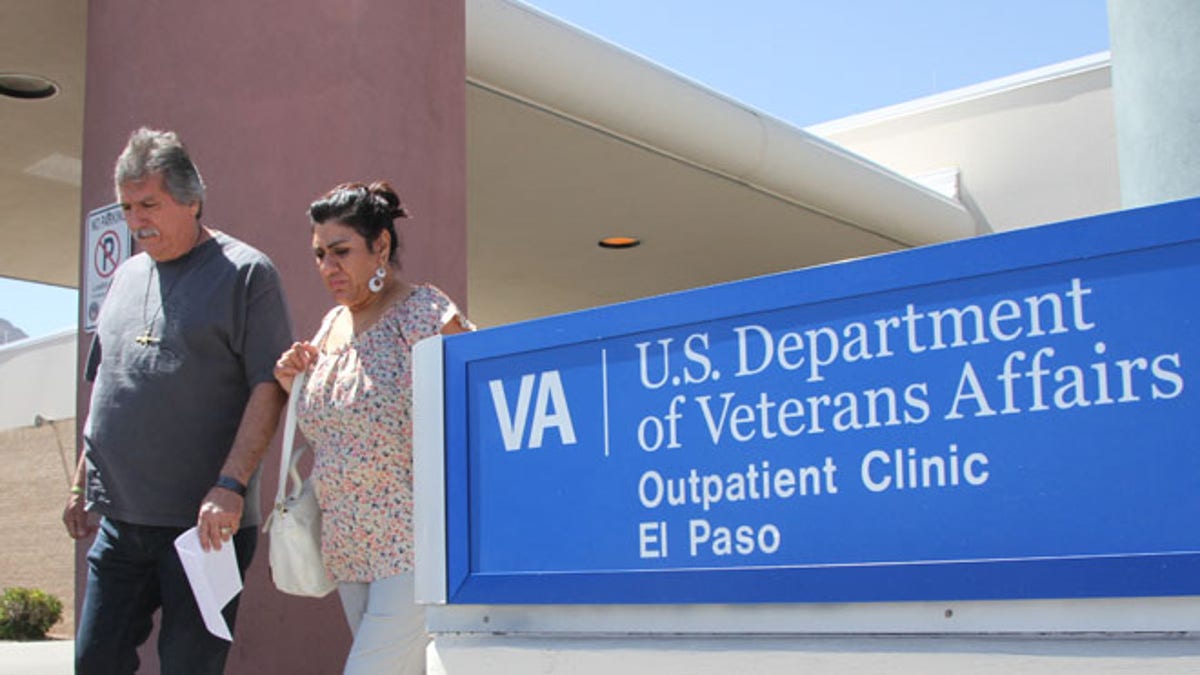
June 9, 2014: David and Marianne Trujillo exit the Vetaran Affairs facility in El Paso, Texas. (AP)
WASHINGTON – Fiscal hawks are warning that new legislation passed in both chambers of Congress this week in response to the Veteran Affairs scandal could cost taxpayers more than $500 billion over the next decade.
A Senate source told FoxNews.com on Friday that lawmakers "passed a bill they didn’t read which led to Congress issuing a blank check with real consequences for the country down the road."
The Committee for a Responsible Federal Budget rang the alarm bells over the bill on Thursday, releasing a statement saying the Senate version of the bill “violates every principle of good budgeting, and could add substantially to the national debt.”
The group claimed the bill could create an entitlement program bigger than Medicare Part D (the prescription drug program), citing in part nonpartisan congressional budget estimates.
The Congressional Budget Office estimates that preliminary costs for just one provision of the bill -- which gives the VA authority to contract with private health care providers to ensure veterans get care -- would exceed more than $35 billion through 2016. The CBO also estimates that the provision could ultimately cost $50 billion per year.
“If the program were permanently extended, and fully phased-in costs grew with inflation, the total cost could exceed $500 billion over the next decade before interest,” the CRFB warned.
“In fact, for the cost of making this new entitlement permanent, policymakers could fully repeal the defense sequester,” CRFB added.
Congress is acting with urgency to address the growing scandal at the VA, where thousands of veterans have endured long wait-times that were sometimes covered up to make internal figures look better. With internal reviews and investigations showing the extent of the delays and scheduling disarray in the system, lawmakers do not want to wait for the administration to slowly address the agency's longstanding -- and potentially deadly -- problems.
But the legislation moved with surprising speed, by congressional standards, and critics say the spending component has not been vetted. Another Senate source told FoxNews.com that the bills were fast-tracked and that “almost no one had time to look at the CBO analysis before the vote. Nobody had any idea what they were voting on.”
The source added that, “if fixing a crisis were as easy as writing a blank check, we’d be doing it all the time. That’s not what it means to govern.”
On Wednesday, the Senate passed a bill, 93-3, that would allow veterans to turn to private care providers if they face long wait times at Veterans Affairs hospitals and medical facilities.
The Senate legislation would allow vets to go to civilian doctors for the next two years if they live more than 40 miles away from a treatment center or if they have been waiting for more than a month for a doctor’s appointment.
Among other things, the Senate bill also gives the VA 60 days to create disciplinary procedures for workers who knowingly falsify wait-time data, lets the agency more quickly fill medical jobs with the greatest shortages and lets the VA enter into leases for 26 major medical facilities in 17 states and Puerto Rico.
Senate Veterans Affairs Committee Chairman Bernie Sanders, I-Vt., and Sen. John McCain, R-Ariz., lobbied hard for the legislation, which came on the heels of a series of scandals involving lengthy wait times for veterans and allegations that officials at VA centers across the country cooked the books to cover up their actions.
Sens. Jeff Sessions, R-Ala., Ron Johnson, R-Wis., and Bob Corker, R-Tenn., voted against the bill.
The three senators sent a June 13 letter to Rep. Jeff Miller, chairman of the House Committee on Veterans’ Affairs, alerting him to what they consider “several serious flaws” with the Senate bill.
“The problems exploding at the VA are the project of years of mismanagement, failed oversight, and the unaccountable expenditure of taxpayer dollars,” the letter, which was made available to FoxNews.com, said.
They also argued that the Senate bill would add $435 billion or more over the next decade to the nation’s debt.
“That is because the program is neither funded nor offset by spending reductions in lower priority programs,” the letter said. “This is one of the largest new programs Congress has passed in 50 years. It is thus rather remarkable that such legislation would be passed before senators had even reviewed a CBO analysis.”
The House passed a similar bill Tuesday. Like the Senate version, the House would require the VA to pay for outside medical care for service members who have been unable to see a doctor or who live 40 miles away from a VA-affiliated facility. It also makes it easier for the VA to fire or demote agency officials. The House bill, though, calls for a study of the costs, which the CRFB called more "responsible."




